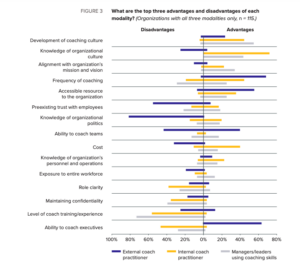Over the last 20 years or so, we have seen quite a bit of shift in the way coaching has evolved in practice as well as in the way that it is perceived. When coaching was a relatively newer offering, it was mostly reserved for executives who were seen having a “development’ area that they needed to work on – and it was usually mandated by the Board.
Now, another reason why coaching was reserved for those serving at the topmost rung of the organisation was the cost. An executive coach with a decent amount of experience and good reputation could cost upward of $3,000 an hour! Which then led to the idea that coaching was for the ‘more important’ members of the organisation.
This, however, has changed particularly in the last few years – wherein organisations today recognise that incorporating coaching can improve performance at all levels. This awareness along with advancements in technology has resulted in the decrease in the price for coaching services and an increase in its accessibility.
Among the many benefits being reported, in the corporate world, coaching is proving to speed the development of soft skills, such as resilience, emotional intelligence and collaboration. Using the coaching approach, organisations are able to drive engagement in their employees by boosting their morale & motivation and making them feel valued. According to research by the Human Capital Institute, 54% of organizations classified as “High Performing” have a strong coaching culture as compared with 29% of all other organizations.
Data like this tells us that the democratisation of coaching is only going to accelerate in the future – and this is something every coach needs to be cognisant of and thus, prepare to make shifts in order to keep up with the times.
Some Organisational Shifts to Look Out for
Apart from conducting formal coaching engagements with (i) external coaches and (ii) internal coaches, organisations seeking to build a culture of coaching also look to (iii) managers/leaders be trained as coaches.
In a study ICF conducted in collaboration with HCI in 2019 on building coaching cultures, one thing that stood out clearly was that a large percentage of organisations (83%) are planning to expand on the scope of mangers/leaders as coaches in the next five years. The number remained high for expanding the scope of internal coaches as well (66%). The plan for external coaches? 58% organisations aim to maintain the scope for external coach practitioners in the next five years.

Before we consider the possible implications of this, let’s look further at what organisations consider to be the major advantages and disadvantages of all three modalities, i.e., external coaches, internal coaches, and managers/leaders as coaches.

A few things that stand out amidst all this data:
- While the knowledge of organisational culture is a massive advantage for an internal practitioner and manager using coaching processes, the knowledge of organisational politics is a dampener for an external coach, who will have very limited information in that area
- The ability to coach senior executives is seen as a major advantage for an external coach, whereas an internal coach or manager may not be preferred due to perceptions around seniority or experience
- The cost that is incurred for an external coach is going to be far higher (and thus would be considered a disadvantage) as opposed to an internal coach or manager as coach
- And lastly, the frequency of coaching for a manager-coach as well as an internal coach will be a disadvantage due to a higher probability of them being involved in organisational activities; this would be a great advantage for an external coach however, who coaches for a living and can commit solely to coaching for extensive periods of time as per demand
So, What Does This Mean for Coaches?
Going by what the data is telling us, here are a few things coaches can expect in the coming years:
- The preference for external coaches in comparison to internal coaches is likely to go down. At the same time, going by the list of advantages and disadvantages that we looked at above, there will be a balance in the use of external and internal coaches for senior and junior roles in the organisation respectively. Managers will be trained with coaching skills and knowledge to bring it to their day-to-day and thus will be better suited for coaching junior-mid level employees, whereas external coaches will be sought for senior executives
- Team and group coaching is on the rise and therefore certified, experienced coaches who also specialise in team coaching would be preferred over internal coaches/ managers as coaches who may not have received the same level of training and experience as their external counterpart
- Coaching is more likely to be offered not just as standalone anymore, but as part of a larger offering – like a leadership development program. When asked how coaching activities are used to address their organizations’ goals and strategies, the top three cited purposes were leadership development (55%), talent development (51%) and performance management conversations (49%).
How can coaches navigate through these changes to tip the scales in their favour? We’ll give you more insights on that soon. Keep watching this space for updates!
About Simply.Coach
Simply.Coach is an enterprise-grade coaching software designed to be used by individual coaches and coaching businesses. Trusted by ICF-accredited and EMCC-credentialed coaches worldwide, Simply.Coach is on a mission to elevate the experience and process of coaching with technology-led tools and solutions.
Read More:
Developing a Coaching Plan for Leaders, Teams, and Clients
3 Leadership Coaching Books to Help You Get Better at Your Craft
What’s the Right Time for an Organisation to Hire a Coach for Their Executives?
Do You Need a Consultant or a Coach?
What’s Your Corporate Coaching Niche?
Differences (and Similarities) Between Executive and Leadership Coaching

Executive Coach & Co-founder of Simply.Coach
Recognised as one of the Most Talented Coaching Leaders in India by CHRO Asia, Ram is an ICF certified coach with more than a decade of coaching experience Before co-founding Simply.Coach in 2020, Ram worked across the gamut of organisations, from start-ups through to global MNCs. Having served as VP and Country Manager for Publicis Sapient, Ram’s corporate expertise helps him focus on positive change to empower leaders to reach their goals









